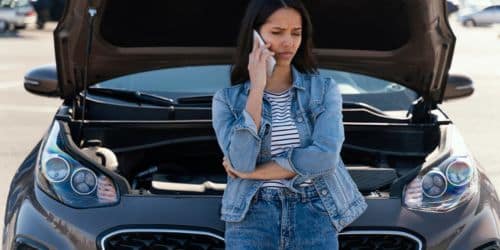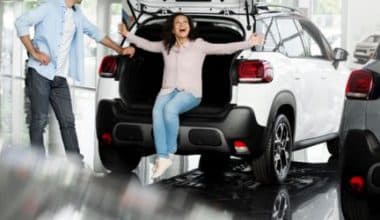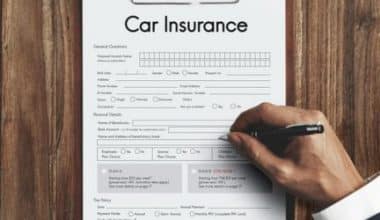Liability coverage for those who do not own a vehicle but frequently use the transportation services of others is available through non-owner auto insurance. In the event of an accident involving a borrowed or rented vehicle, the non-owner’s policy’s liability protection comes second to the owner’s policy. You can also use non-owner car insurance as proof of insurance if you need to fill out an SR-22 form. Read further to get more information on how to get car insurance without a car. Let’s dive in now!
What Is Non-Owner Car Insurance?
The term “non-owner car insurance” refers to protection for those who do not own a car but who make frequent use of other people’s cars, ride-sharing services, or loaned vehicles. If you have a driver’s license but don’t own a car, you may be able to get non-owner insurance. If a potential policyholder lives in a home where a car is kept, many insurance companies will not issue non-owner coverage.
Things to Know About Non-Owner Car Insurance
The following are things to know about it:
- Non-owner insurance includes the bare minimum protection required by law, with some additional coverage available as an add-on.
- Auto insurance for drivers who do not own their own vehicles is available from most major providers.
- The annual premium for liability-only coverage ranges from $200 to $500.
- If you don’t have a car but expect to use rental cars or borrowed vehicles frequently, you may want to look into non-owner auto insurance.
How Does Non-Owner Car Insurance Work?
Non-owner car insurance provides supplementary liability protection. This indicates that the policy of the owner will be used first, and then the policy of the non-owner will be used to cover any residual liabilities. If you frequently borrow or rent cars, or if you just want to maintain continuous coverage in between vehicles, non-owner car insurance may be the best option for you. High-risk drivers who need liability coverage to maintain their license or file an SR-22 often find that non-owner auto insurance is the best option for them.
What Does Non-Owner Car Insurance Cover?
When compared to conventional car insurance coverage, non-owner car insurance often offers equivalent protection. Insuring yourself as a non-owner will protect you from:
- Accidents you create that result in injuries to other drivers
- Physical harm to others’ property, excluding your own car
- Automobile collisions brought on by drivers who lack enough insurance
- Accident-related medical costs
Can You Get Car Insurance Without a Car?
Yes, you do not need to own a car to qualify for car insurance. Non-owner auto insurance provides coverage regardless of who owns the vehicle you are driving, while other forms of auto insurance often only cover the vehicle’s owner. Non-owner insurance, then, follows the driver rather than the vehicle.
When you cause an accident while operating a vehicle that does not belong to you, this sort of insurance will help pay for the resulting expenses.
Best Non-Owner Car Insurance
The following are the best non-owner car insurance companies you can opt for:
- Nationwide
- State Farm
- Allstate
- Liberty Mutual
- Farmers
- American Family
- Mercury
- Acceptance Insurance
- Dairyland
- Direct Auto
- The General
How to Get Car Insurance Without a Car
The following are ways to get car insurance without a car:
#1. Check the Prices at Several Companies
If you aren’t the owner of the vehicle being insured, you should obtain quotations from at least three different insurance providers to find the most affordable policy. Non-owner insurance quotes are not typically available online, so you’ll have to call around several companies to obtain prices.
#2. Get the Necessary Information Ready
The insurance agent will ask for your personal information, such as name, DOB, phone number, address, and profession, when you go to acquire a non-owner auto insurance policy. Information regarding your prior insurance policy is also required.
#3. Choose How to Pay
When you buy a policy, you get to decide how often you want to renew it and how often you want to pay the premium. Monthly payments are an option for drivers who want to purchase a six-month or annual policy. A pay-in-full discount is offered by many insurance providers, so paying for the entire policy at once could save you money.
When to Consider Non-Owner Car Insurance
The following are things to consider when getting it:
#1. Your License Was Suspended for a Significant Offense, but You’re Now Trying to Get It Back
If you have had your license suspended due to a DUI or other serious traffic crime, filing an SR-22 or FR-44 may be required by law in your state. You’ll need to verify that you have auto insurance as part of this procedure. Non-owner insurance policies can be purchased to fulfill legal obligations even if you do not own a vehicle. Insurance for drivers who do not own a car is often more affordable than insurance for owners.
#2. You Are a Frequent User of Car Rental Services
As part of the standard rental charge, most states mandate that rental car agencies also provide liability insurance at the bare minimum required by law. While some states, like California, do not mandate that rental agencies carry liability coverage, others have minimums that are inadequate. Additional liability insurance can be purchased at the rental counter for $10–$16 per day. If you rent automobiles frequently and seek more than the bare minimum of liability protection, it may be more cost-effective to purchase your own non-owner policy.
If you pay with a credit card, your credit card company will cover any damage to the rental car; debit card transactions do not include liability insurance.
#3. You Are an Avid User of Ridesharing Programs
As part of the rental charge, most car-sharing services also provide liability insurance. But if you get non-owner insurance, you’re covered whether you’re driving your own car, a rented one, or one you got via a car-sharing program.
#4. You Are Borrowing a Car from a Friend or Family Member
If you get into an accident while driving someone else’s automobile, the policyholder will typically pay for your damages. However, if you rent a car, the owner, not you, decides how much insurance to get. And if there are issues with your claims, the insurance company does not consider you a customer. You can rest assured that you have sufficient liability coverage under your own policy.
#5. You’re Temporarily between Cars
A non-owner insurance policy is a cheap option to preserve continuous coverage and long-term customer status if you currently don’t own a car but intend to in the near future. You’ll be protected even while you’re just out cruising the lot. You must notify your insurance company promptly and switch to an owner’s policy once you have purchased a vehicle.
Is Non-Owner Car Insurance Right for You?
Maintaining a car insurance policy during a period in which you do not legally own a car is possible with a non-owner policy. Maintaining continuous coverage may qualify you for lower premiums and shield you from the rate increases that affect people who go without protection for a period of time.
You can also get a non-owner policy if you are a car owner in specific situations. If your current insurer does not support filing certificates like the SR-22 or FR-44, you can get separate non-owner coverage from another insurer. This technique typically involves minimal additional expenditures because the secondary coverage does not cover your vehicle.
Read Also: CAR INSURANCE COLORADO: Coverage, Cost & Best Options
When Not to Use Non-Owner Insurance
It’s not a good idea to get non-owner automobile insurance if you are:
- If you don’t have access to a vehicle, it’s best to share housing with someone who does.
- Avoid driving by making use of alternative transportation options.
- If you just hire a car for occasional use, it may be worthwhile to invest in temporary insurance.
- Make no preparations to buy a car.
How Much Does Non-Owner Car Insurance Cost?
While rates for non-owner auto insurance might range widely, they are often more affordable than those for vehicle owners. Because they drive less frequently, people who don’t have automobiles are seen as lower risk by insurers. Expenses can be affected by variables such as:
- How much personal injury protection do you require?
- The length of your driving record
- Your location
- If you aren’t the owner, you can save money by shopping around for a room.
Why Is Non-Owner Car Insurance So Cheap?
Non-owner insurance is less expensive than standard car insurance because it just covers liability and its customers often have lower annual mileage totals. Due to lower mileage and claim frequencies, non-owner car insurance tends to be less expensive than standard plans. Insurers frequently inquire as to how many annual miles you anticipate driving. Regular drivers have a higher probability of being involved in an accident, increasing the likelihood that their insurer may have to pay out on a claim.
Insurance companies discount their rates for those who don’t own cars because they figure those people don’t drive as much. Since full-coverage policies generally include comprehensive and collision coverage, which pays for your own vehicle’s repairs or replacement in the event of an accident, non-owner auto insurance is typically less expensive than a full-coverage policy.
It can account for half or more of the total cost of comprehensive insurance, making it one of the most costly parts of your coverage.
Methods for Comparing Prices on Non-Owner Car Insurance
Most insurance providers don’t provide online rates for non-owner coverage, so getting a price will require making a phone call. Non-owner auto insurance policies are uncommon; therefore, you may need to look for a non-typical insurer.
Those looking for non-owner auto insurance may be considered high-risk, so they may be better served by a non-standard insurer. Insurers will see you as a greater risk on the road if you go without auto insurance or if you cancel your policy after a long period of time. This is true even if you’ve never had a need for auto coverage before. Non-owner auto insurance policies are also notoriously difficult to secure.
If you are a non-car owner who needs an SR-22 policy, you may have to settle for a non-standard auto insurance policy. This is a common situation for drivers whose licenses have been suspended (typically for DUI), who do not have access to a vehicle, and who are required to complete Form SR-22 in order to have their driving privileges returned. An SR-22 is a certificate of financial responsibility filed by your insurer on your behalf.
Do You Need Insurance if You Have a License But No Car in Florida?
You must have a certain amount of liability insurance in all states except New Hampshire and Virginia in order to drive your car. You need car insurance to legally buy and drive a car. However, there is no need for insurance if you do not own a car. Therefore, having car insurance is optional.
Do I Need Car Insurance if I Don’t Have a Car in Ohio?
If you never drive or do not possess a registered vehicle, then no, it is not against the law in Ohio to go without insurance. However, it is illegal to drive in Ohio without insurance, and doing so can result in license suspension and reinstatement fees of up to $600.
What Is the Primary Function of Insurance?
Its purpose is to mitigate monetary risk and make inadvertent losses bearable. It does this by giving a professional insurer a small, known fee, called an insurance rate, in exchange for taking on the risk of a big loss and promising to pay if that loss happens.
What Exactly is All-inclusive Coverage?
A formal definition for “full coverage” isn’t available because it’s not a real car insurance term. However, in most cases, this term is used to describe a policy that includes both liability and comprehensive collision protection.
Final Thoughts
Non-owner car insurance meets the minimum liability requirements set by the state. Non-owner auto insurance is far less expensive than a standard policy. That’s in part because the owner’s insurance policy, not your own, covers both your injuries and the damage to the car. Why not try to get yours from the best that suits your budget today?
- The Hartford Business Insurance Review 2023
- BEST INSURANCE COMPANIES IN NORTH CAROLINA 2023
- SNOWMOBILE INSURANCE: Coverage, Cost & Best Options






